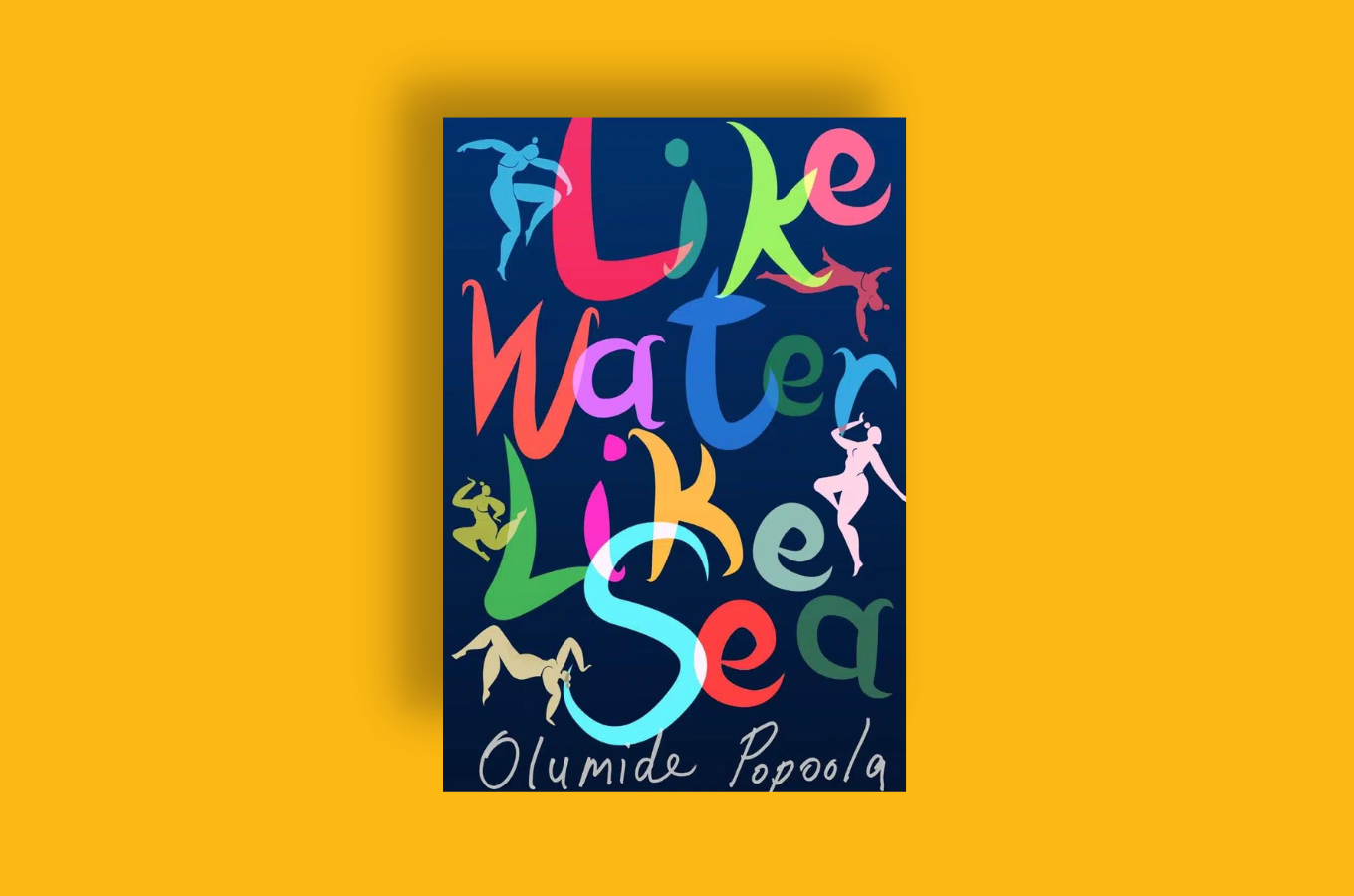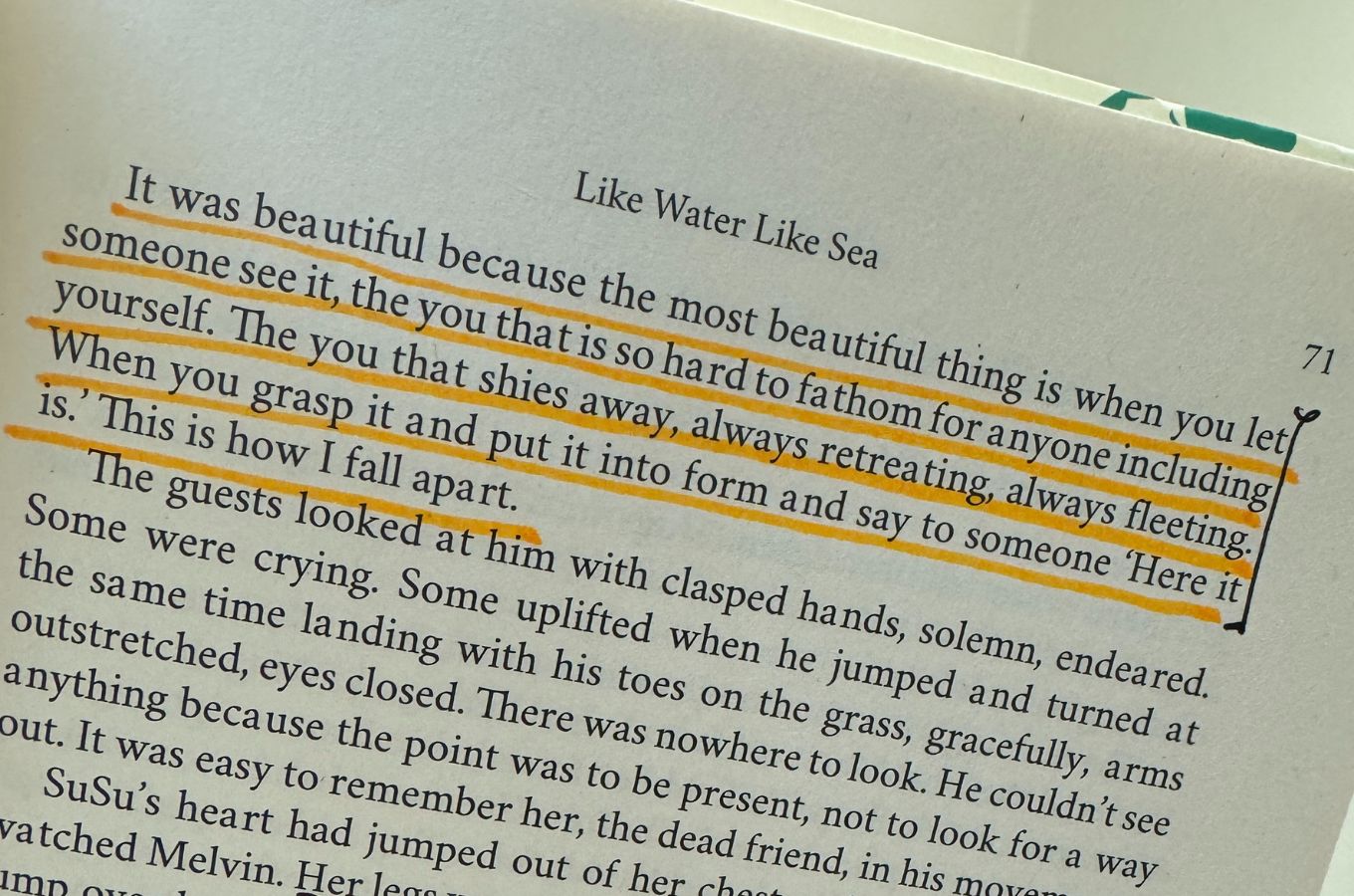
Like Water Like Sea by Nigerian-German author Olumide Popoola is a novel that lingers with you long after you’ve finished reading. It’s the story of Nia, a young woman in London. When we first meet her, she’s floating in a river. That image—Nia in the water, fully clothed—sets the tone for the entire novel. The opening scene immediately draws you in and you wonder what has led her to this point.
Nia’s sister, Johari, died ten years before, and that loss still looms largely in her life. But the novel isn’t just about the event of her sister’s death; it’s about the emotional and psychological impact of that loss, how it remains unresolved, and how it continues to shape Nia’s journey of self-discovery. Surrounding Nia is a close-knit group of characters—Susu, her mother, who struggles with mental health issues; Melvin, her confidant; and others like Temi, Rahul, and Crystal. They make up her tribe, picking up those pieces of Nia that seem not to stay in place through her journey with herself.
I can’t say if I loved the book or not. I’ve always found “love” to be a limiting way of describing my response to a book. What I do know is that this book took me to intensely soft and raw places. There are books you remember for how they made you feel. This is one of such books, and there are three distinct things I can point to explain why: Audre Lorde, water, and falling apart.
During a ten-year anniversary of Johari’s death, Melvin reads the poem “Litany for Survival” by Audre Lorde. If you know that poem, you know the weight it carries. Popoola weaving the poem into her novel feels like she’s pulling in the full force of black feminist traditions. As a reader, it enriches the experience for me. I’m not just hearing Melville’s voice or the voices of the other characters—I’m hearing a chorus of voices calling at me from outside the book. The novel speaks to me on a deeper level and becomes almost spiritual and archival. This gives the book a certain weight. I’m grateful Popoola included that poem because it stayed with me long after I finished reading. The line “For those of us who live at the shoreline” resonates deeply, especially when we consider how the novel uses water as both a literal and metaphorical space.
Water, as a symbol, is everywhere in the novel. It’s an organizing image that captures the fluidity of human emotions. For me, water is a precarious place—it unmoors me and goes against my need to feel grounded. In Like Water Like Sea, water becomes a powerful image for understanding the self and meeting the demands of those moments that leave us shaky and unsure. The novel makes us think about how water is not just something that either quenches our thirst or threatens to drown us; it mirrors the way we move through the world, survive difficulties, and adapt to change.
The chapters are short and fragmented, each from a different character’s point of view, and they begin with one of three different titles: The Dancers, The Climbers, or The Swimmers. These chapters are like snapshots, capturing a scene, a feeling, an image. They punch you with emotion, leaving you with something that lingers. It’s like life, isn’t it? Disjointed, messy, falling apart at times. And that’s what’s so beautiful about this book—it doesn’t hide that messiness. It embraces it, showing us that falling apart is just as much a part of life as keeping it together.
There’s a quote from Nia reflecting on Melvin’s dance during Johari’s funeral that I’ve returned to a few times since reading the book:

Now, I’ll admit, the literary scholar in me wanted to make a big deal about that reference to “falling apart.” I couldn’t help but think of Things Fall Apart by Chinua Achebe—how that phrase has become almost like a psychological patent in our language. But then I stopped myself, because that was taking me away from the real connection I was feeling with the story. Instead, I started thinking about who in my world I would be okay showing “how I fall apart,” and I realized—there aren’t that many people. And that made me appreciate this novel even more. It’s about finding those people who can see you in ways others can’t, who can witness your fall without turning away.
Think about it—how often do we let people see THAT side of us? We build these walls, put on a brave face, but inside, we’re fraying. Like Water Like Sea is asking us to look back on on those moments when we felt like we couldn’t hang on any longer and see if there was something true there, something that’s part of who we are. Earlier, I said that I remember the novel more for how it made me feel. I think it has something to do with the moment I read it. I read it in a hotel room in Berlin, with the sun breaking through the curtains early in the morning. I felt a soft, dark cloud all around me—the grief, the yearning for connection. It was all so strong. Being away from home made me yearn for what Nia had—a chorus of friends, family, and lovers who made her life both complicated and rich. Good books delight us, but great books remind us of what we have, or what we want to have. They leave us with a truth.
This novel doesn’t just tell a story—it invites us to reflect on our own journeys, on the ways we survive, adapt, and find meaning in the midst of life’s challenges.








COMMENTS -
Reader Interactions